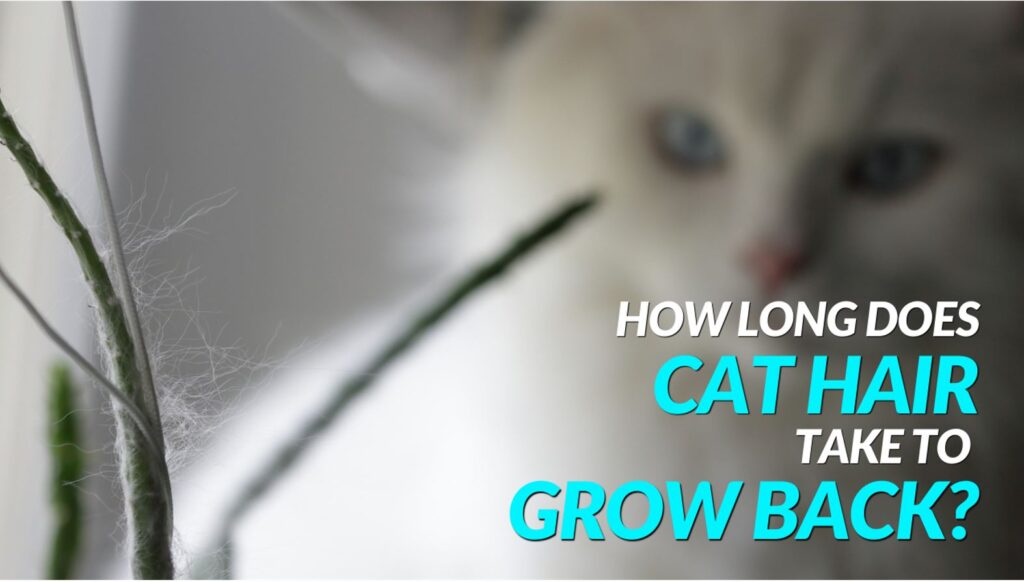If your cat is recovering from a medical condition that caused its hair to fall out, you may be wondering when it will grow back.
The short answer is, it takes 2-3 months for short-haired cats and 3-4 months for long-haired breeds. However, there are plenty of factors that impact the growth rate of your kitten’s hair.
Let’s dive into some helpful tips that will help you speed up the process of getting their hair back.
How Quickly Can Cat’s Hair Grow?
It usually takes eight to twelve weeks for a cat to grow its hair back. But some factors like surgical operation, wounds, dietary deficiency can slow down or even abandon the hair growth in the affected region. Like human beings, cat’s hair can stop growing for unknown reasons as well, but such instances are rare.
At the same time, healthy cats can have tremendous hair growth, sometimes more than the owner’s expectations. Cats with short hair also show incredible pace when it comes to gaining new fur. Such cats need frequent grooming sessions.
Your cat’s breed plays a major role in determining hair growth but an average cat requires 2-3 months for this process.
We suggest a consultation with a vet before shaving your cat. Their skin is relatively sensitive and needs more care than you may expect. Outside of medical procedures and standard grooming, you shouldn’t be too interested in trimming the hair too short.
Professional shaving can keep your cat safe from scissor’s injuries and ensure regular hair growth, rather than acting as a shaving expert!
Tips To Make Your Cat’s Hair Grow Faster
If you love your cat, you’ll need to step up and take one of the following initiatives.
- Add proteins to their diet
Protein is very important for hair growth. A slow growth indicates the deficiency of protein in the diet. Only meals filling the tummies won’t help them, adding proteins to the plate is the key.
- Add minerals to their diet
Feed your cats with essential minerals like zinc that help a lot in hair growth. Use frequent doses of minerals in your cat’s meal and see the magic.
- Add Vitamins to their diet
Inadequacy of vitamins can result in loss or slow hair growth in human beings. The same is with our kittens. Feeding the right amount of vitamins can prevent the discontinuity of hair in cats.
- Regular Brushing
Did you know that dead hair if left unchecked can hinder the growth of new hair? Well, they fall into the fur and block the way of new hair by sticking into the roots of the skin. Such tangled hair also invites parasites and other insects to reside and create allergies in the cat’s skin.
In order to avoid both issues, you must spend some time brushing and grooming the cat’s hair, getting rid of the old ones, and allow some space for the newcomers.
- Regular Bathing
Just like brushing, bathing is very important. I know it may seem to be a daunting task, but washing the unwanted hair and cleaning germs from the fur can help her gain new hair. There are shampoos available in pet stores for this purpose. Do not employ human shampoo as it may irritate the cat’s skin. We suggest bathing once a month.
- Remove things that stress your cat
Pet anxiety is one big reason behind many diseases and hair loss is one of them. Figure out why your cat is depressed. Is it the separation of partner or shifting to a new home?
A stressed cat naturally sheds a lot. The only way is to distract them and remove anything that further elevates the stress.
Bottom Line
The cat hair requires 2-3 months to grow back. There are many factors that impact the growth of new hair and improper addition of nutrients to the meals is one of the major causes for slow growth.
If you need a hair-packed cat revolving around your feet, take special care of her health. The healthier the cat, the better the hair growth!

